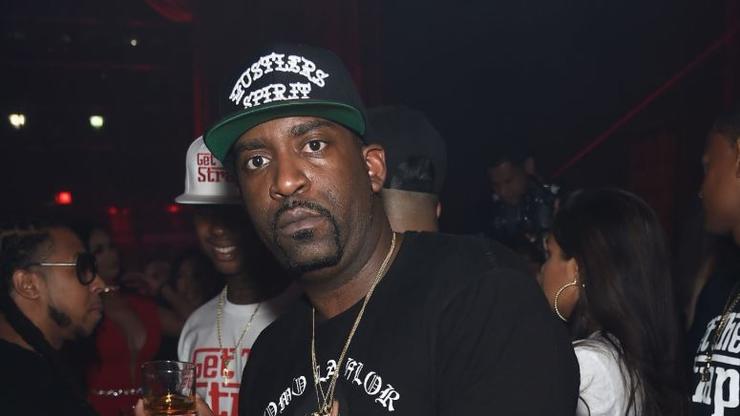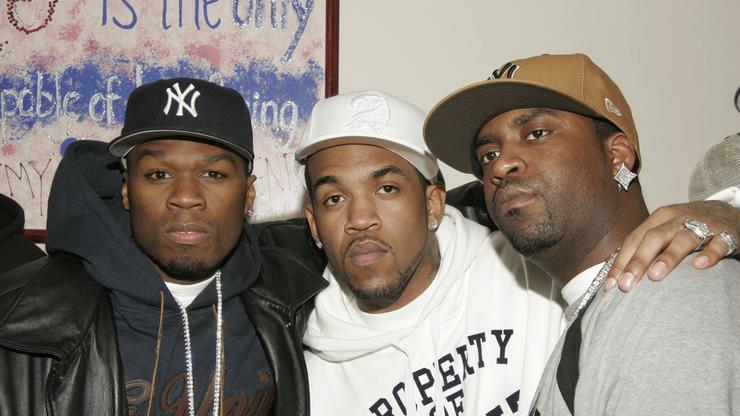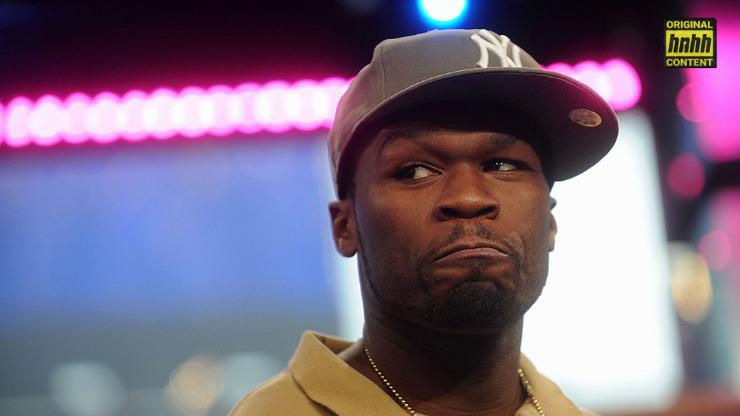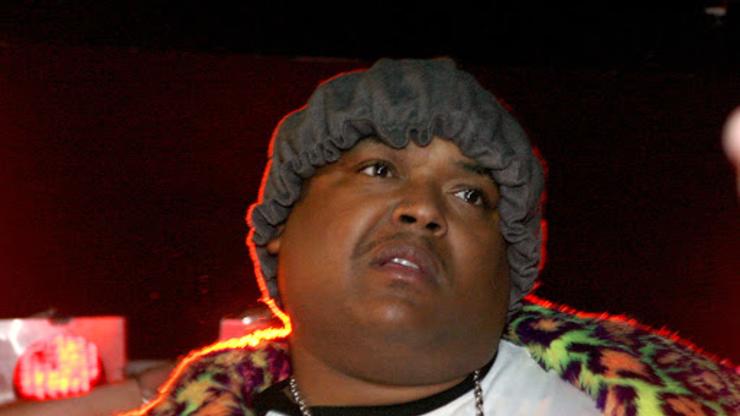This year is turning out to be full of surprises. It's safe to say that DMX doesn't have any Tony Yayo tracks in his playlist after the barking rapper spoke out against his fellow emcee. Initially, DMX shared that he wasn't a fan of Lloyd Banks during a conversation with Fat Man Scoop. "Lloyd Banks? Lyrical?" DMX asked. "Quote four bars. Impress me with four bars of his. It shouldn't be hard." Lloyd was made aware of X's remarks, and tried to figure out why he was being targeted by the rapper. Then, someone must have reminded DMX who Lloyd Banks actually was, because he admitted that he was really speaking about Tony Yayo when he made the remarks about Banks.

Theo Wargo / Staff / Getty Images
Later, DMX issued a formal apology. "It takes a real n***a to admit when he's wrong..... My apologies to loyd banks I was thinking tony yayo when I was asked about banks. I f*ck with banks!" On Friday (May 29), the former G-Unit rapper took a moment to address the controversy over on Twitter. An unfazed Tony Yayo wrote, "Dmx a crack head who cares what he think," along with a crying laughing emoji. Check it out below.
50 Cent Expresses Regret Over How Lloyd Banks & Tony Yayo’s Careers Played Out
In 50 Cent’s book “Hustle Hard, Hustle Smarter,” he spoke about why Lloyd Banks and Tony Yayo never were able to amass the same amount of success as himself.
In an effort to continue his world domination, 50 Cent has released a memoir-ish book, Hustle Harder, Hustle Smarter. The media mogul shares stories of his rise to fame and his ability to go from running the streets to owning multiple businesses, having a successful rap career, and elevating a media company that has produced a number of hit shows. Also inside of Hustle Harder, Hustle Smarter, Fif speaks on his days with G-Unit—specifically, Lloyd Banks and Tony Yayo’s inability to reach the same levels of success that he was able to attain.
“I always felt that if I had maybe done a better job teaching Banks and Yayo how to evolve and change their habits, they each would be in better places right now,” 50 Cent shares in his book. He felt that as the leader of G-Unit, he should have been a better guide. “While I was out hustling (I actually hustled with his father), Banks was more content staying on his porch and watching the world from there. Banks wanted things to come to him, as opposed to going out and getting them for himself. That’s not me trying to assassinate his character—the guy has ‘Lazy Lloyd‘ tattooed on his arm. He literally wears his laziness on his sleeve.”
Fif went on to say that he did try to get Lloyd Banks to adapt to the changing times, especially as social media advanced, but it didn’t work. “To me, one answer was to change how he interacted with the culture,” the rapper reportedly wrote. “That’s why years ago I told Banks to film a video of his life and post it on YouTube. Introduce people to his lifestyle. Let the camera follow him around for a while and see how he moves. Maybe something he says or does will create a spark, go viral, and then he’ll have some heat around him again.”
When that didn’t work, 50 Cent attempted to get Banks to be more active on Instagram, especially because he could be “a little awkward in person.” Banks wasn’t having it. It was then that Fif decided he didn’t want to invest in Banks anymore. “Age isn’t about what year you were born—it’s about how you approach the year you’re in right now. If you’re open to new experiences, willing to take chances, and curious about new topics, you’re young. Period.”
Tony Yayo, on the other hand, was allegedly still caught in operating by the code of the streets. “If I got into a disagreement with another artist, Yayo’s reaction was ‘Let’s just bang ’em,’ because that would have been his response back in the neighborhood. If we got $100,000 for a series of club appearances, Yayo wasn’t thinking about putting it in the bank. His first thought would be ‘Hey, this could get us three and a half kilos of cocaine. Let’s flip those, and we’ll be sitting on some real money.'”
That wasn’t how Fif wanted to do business, and ultimately, things began to fall apart. He also added that the things he’d written about were all issues that he’d spoken with his cohorts about, so he isn’t saying anything they haven’t already heard.
50 Cent Changed Mixtapes Forever
With the lines between mixtapes and albums blurrier than ever, we look at how 50 Cent revolutionized the format forever on his road to “Get Rich Or Die Tryin’.”
Since the arrival of Get Rich Or Die Tryin’ in February 2003, 50 Cent has been entrenched in the hip-hop mainstream. Working as both an active participant and the proprietor of his own G-Unit stable, the South Jamaica, Queens native has never strayed far from the audience’s mind even after twenty years in the game. In the era of alleged “industry plants”, it’d be assumed that anyone shifting 872,000 copies of their debut album in first week sales had been groomed for the spotlight. 50, on the other hand, wasn’t chaperoned to that point. A quadrilogy of iconic mixtapes mapped out his path to superstardom. Tearing through the game like a cyclone, 50’s mixtape success left the perfect blueprint for others to follow as technology evolved from physical distribution into an online marketplace.
Based on the accessibility that the internet now affords both artist and consumer, the concept of getting “rich off a mixtape” a la Drake is no longer a noteworthy occasion. What maps 50 out as special is that when it comes down to it, he was the originator. Prior to his arrival, the term “mixtape” held a very different connotation. Usually helmed by a DJ, these compilations would provide an overview of what was hot at the time with the plaudits and financial rewards all going to the name on the marquee.

Theo Wargo/WireImage/Getty Images
When 50’s career was at its lowest ebb, Jackson realized that he had to do something drastic to stay afloat. Dropped by Columbia and “blackballed” from the industry amid the fallout from the revelatory, Supreme Team-chronicling “Ghetto Qu’ran”, the former Jam Master Jay protégé was stripped of his foundations. As his unreleased debut album, The Power Of The Dollar gathered dust on the shelf, 50 refused to be dissuaded.
Linking up with fellow JMJ mentee Sha Money XL, 50 decamped to the engineer and producer’s home in Westbury, Long Island and set upon the journey that’d take him from the fringes of history to becoming the focal point of a revolution. In the wake of getting shot nine times, 50’s momentum had halted. Under the guidance of Sha, much of the music that’d been laid down prior to that life-altering incident was repurposed for his first groundbreaking mixtape, January 2002’s Guess Who’s Back. “All those records were recorded 18 days, 2 records a day”, Sha told XXL. “Motherfuckers were there for 18 days and had 2 songs. This n***a 50 had 38. He said ‘There’s no way I’m going to leave this place without a record deal. If I don’t have a record deal, I’m going to have 38 Trackmasters’ tracks.’ That’s what I remember him telling me. I said, “This n***a smart.”
As we’d soon learn, that’s a drastic understatement when talking about 50 and his raw business savvy. Holding the rare distinction of getting dissed by Hov before he’d even pushed a Soundscan unit, his rise to cultural dominance may have seemed meticulously planned out. In truth, the decision to upend the way in which mixtapes were used came from everyday interaction.
“A lot of people don’t even know how different marketing and non-traditional marketing impacts the actual culture”, 50 reminisced. “Before 50 Cent Is The Future was released, what they call a mixtape now didn’t exist. A mixtape prior to that was me sending 16 bars to you for your tape. 16 bars to Clue, Ron G, Doowop, Kid Capri and to the different DJ’s that were around. What happened with 50 Cent Is The Future was I was going across the street to the bootlegger and ‘I said you got anything new?’ And he said ‘yeah, look new 50 Cent, see?’ He was selling to me based on me but I didn’t have any photograph or anything. So, I was like, I’m going to make my own tape.”

Jeff Kravitz/FilmMagic/Getty Images
The follow-up to Guess Who’s Back, 50 Cent Is The Future wasn’t just a promotional vehicle for its primary artist, but gave the rest of G-Unit a chance to exhibit their skills. Featuring Tony Yayo, the would-be “punchline king” Lloyd Banks and his inaugural collab with the then-UTP member Young Buck, the second installment of the pre-Get Rich Or Die Tryin’ tapes was the moment that he truly began to pick up momentum. Loaded with interpolations and reworks of The Wu-Tang Clan, Raphael Saadiq, Tweet and Ruff Ryders, the project—which was largely recorded in Canada due to 50’s reputation as an industry pariah—was “physically duplicated” by Sha Money in June 2002. As for distribution, long-time G-Unit affiliate DJ Whoo Kid remembers the grassroots approach to A&R that they employed.
“I would go to the bodega and be like “I’m gonna leave like 20 tapes here”. Cause’ the whole drug culture is connected with 50 Cent”, Whoo Kid told Mass Appeal. “They love his music. So, I’m like “If these guys are coming here to buy drugs, buying weed, getting their nickel bags and shit, there’s a tape on the window right there. Hey, and you get a tape too. I’ll get a bag of chips, a turkey sandwich, and a G-Unit tape.” Using word of mouth as the steam engine to power his eventual come-up, this unsanctioned approach to releasing music changed the world as we know it. And, despite how low-rent its recording and packaging may have been, 50 is aware of the shift that he’d instigated.
Across the remainder of 2002, 50 stuck to the formula and released No Mercy, No Fear and God’s Plan, the latter of which featured the first airing of 50’s “Work It” remix with Missy Elliott. Providing the industry with a lesson about the power of non-conformity, DJ Drama—who ushered in a new era for the mixtape in his own right with Gangsta Grillz—is forthcoming about the impact that this had on an artist’s playbook. “From the 50 era, that’s pretty much when it became a street album. Mixtapes destroyed the demo tape; nobody cared about your demo tape anymore,” he informed Billboard. “It was like, “What are you doing with your mixtape, and how are the streets selling it? I definitely can say that they helped inspire what I went on to do with Gangsta Grillz and the artists that I came up with.”

Jeff Kravitz/FilmMagic/Getty Images
From Drake, T.I, and Wiz to Kendrick, Cole and Big Sean, 50’s entrepreneurship paved the way for the next generation of stars that’d make their name on the independent circuit before being beckoned to the comforting arms of the labels. For the most part, 50 is seen as one of two case studies that epitomize the catalytic power of the mixtape. The other, more often than not, is Lil Wayne. Yet while Weezy used these tapes to reconfigure his sound and prove his credentials as an elite-level MC, 50 rebuffs the notion that they should share the distinction as pioneers.
“He wouldn’t even be making a mixtape because I invented that,” 50 snarled at SOHH. “There’s no significance in that. When he freestyles on a mixtape, it’s in song format because he’s following my format but they ask me about him like we’re the same?” No longer bound by the conventional process that other artists had to adhere to, the wealth of material that 50 had at hand was instrumental in forging a connection that’d change his life. In turn, setting the scene for countless other future legends to get signed off the strength of an ad-hoc project in the decade to come.
“Theo, my attorney, and Paul Rosenberg work close together,” he recalled. “Like they know each other, they came up together so, I had a CD called Guess Who’s Back. Em got a copy of it and he was in the middle of completing The Eminem Show, so he didn’t get a chance to properly listen to it, but after he got that done he heard it and he was like “Ya’ll need to come out here now!” so they flew me out on like Friday night, I fly to Los Angeles the next day and I met with him and Dre and then after we met it was kinda all alright.”
Despite admitting that “the word had reverberated around the industry that this guy was pretty much a wrap,” Shady Records’ Paul Rosenberg couldn’t help but take notice of what 50 had accomplished and made Em aware of this exciting upstart. Discussed during a promotional roundtable for Shady XV, Mathers reflected on the moment that 50, embroiled in his underground hustle, stopped the multi-platinum selling artist in his tracks.

Peter Kramer/Getty Images
“We were somewhere doing a show and our old DJ, DJ Head had the “Your Life’s On The Line” record”, Em told Shade 45. “That was the first record that I remember hearing and being like “holy shit, this dude is fuckin’ dangerous. He was on some MC shit and it’s like yo, he’s a fuckin’ threat. The way he was saying this shit, he just made you believe it. Fif has always been like that but it wasn’t something I’d heard before. He sounds like he’s going to fuck you up… he believes in what he’s saying right now. It was the passion behind it and the lyrics… I was riding around bumpin’ that shit more than anything I was recording myself.”
“They crushed the mixtapes”, Rosenberg chimed in. “No one’s ever going to do mixtapes like that again. This guy made so much money off selling mixtapes that he pulled up outside BET in a fuckin’ Lamborghini. People were fiending for those things, fiending.” Just as he’d withstood 9 shots, 50 Cent circumvented the barriers to the game that’d leave others immobile and kept moving. Left in a sink-or-swim scenario, Curtis Jackson opted to bet on himself and in doing so, forever altered the infrastructure of hip-hop by prising power away from its traditional brokers and emboldening the artists to go it alone.
Bizarre Recalls When Lloyd Banks, Young Buck, & Tony Yayo Stole His Groupies
It be your own crew.
Yesterday, D12 rapper and notorious lyricist Bizarre hit up REVOLT's Drink Champs for a darkly hilarious and informative talk with NORE and DJ EFN. While some of his wild stories were covered here, one of the biggest gems arose much later in the podcast. Anybody familiar with Biz understands his appreciation for some raunchy sexcapades. Luckily, his time spent on the road with Shady Records associates ensured that the groupies came in volume.
In order to maintain some semblance of a healthy touring dynamic, Bizarre and the crew devised a foolproof practice: homie court. "It started from Dre and his crew and got passed down to us," explains Bizarre. "Dre, Dogg Pound and Snoop. It's rules for the homies on the road. When it comes to females or whatever. We got charges. One charge can be 'harboring a known freak.' It's a freak who want to do everybody but you cuff her. We got one called 'eating roadkill.' Whoo Kid was like, a habitual offender of homie court period."

Raymond Boyd/Michael Ochs Archives/Getty Images
"Basically, you gotta get a lawyer. They'll put a subpoena under the door of your hotel telling you what your charges are," he continues. "After you get summons you gotta find you a lawyer. Find a judge. Somebody like Paul or Dre would be the judge. We have this big-ass meeting, everybody gotta come to the lobby. They might even ask for a conference room in the hotel. If you lose you get like, for thirty days you gotta clean the bus."
Unfortunately, the dynamic went awry when G-Unit joined the tour. "When we started touring with G-Unit, I was warning everybody they outlaws. They don't listen to the rules. One of my homies had this chick and he said 'my chick is in the lobby.' I said 'yo you better go get her, those G-Unit n***as in the the lobby right now. 50 keep like thirty, forty entourage members around. I was like, 'you better get her!' So went down to the lobby and grabbed the chicks. Then we get on the elevator."
"Lloyd Banks, Buck, and somebody else was on the elevator," continues Bizzy. "The girls are in the middle of the elevator. We're in the front. We can't see what they're doing or nothing. So when the door opens for us to get off our floor, we get out and the chicks about to get out with us. Then I see Tony Yayo pushing the button. We go what!? And the door just closed." He mimes a diabolical wave and gleeful grin for emphasis. "They took our chicks man!" Is it surprising, however? On their classic crew album Beg For Mercy, G-Unit did drop off a song by the name of "Groupie Luv." Evidently, that old adage "write what you know" holds true once again.
Check out the full episode of Drink Champs right here.








